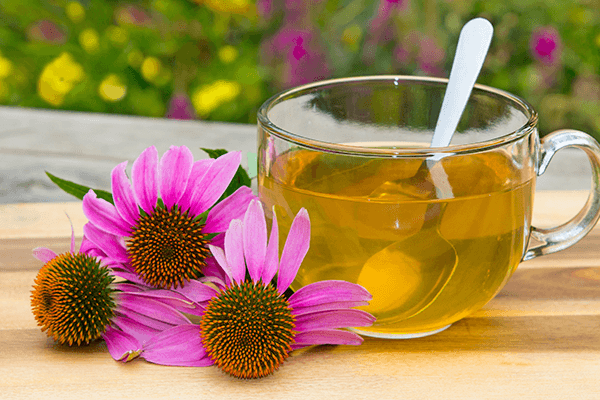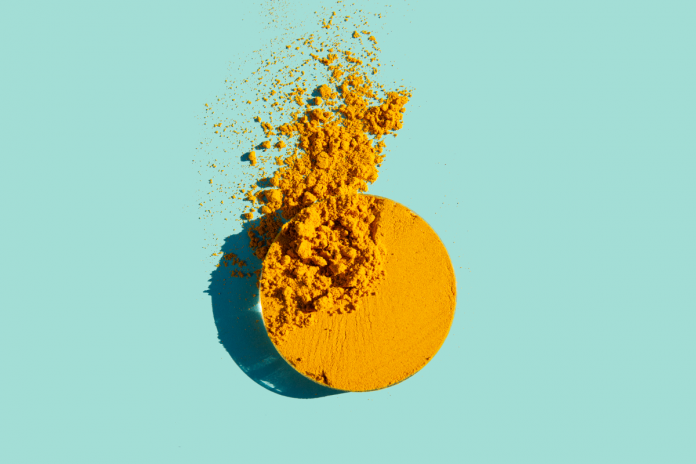Ashwagandha. If you’ve ever wondered what the heck it is, and how you might benefit from it, we’ve got all the details for you!
Put simply ashwagandha is an adaptogenic herb popular in Ayurveda and traditional herbal medicine practices. And you may be able to score its potential health benefits by drinking Ashwagandha tea.
We’re diving into everything you need to know about this Ayurvedic herb, including its rich history, flavor profile, how to make Ashwagandha tea, and more.
What is Ashwagandha?
Ashwagandha, which sometimes goes by its botanical name, Withania somnifera, is a plant in the Solanaceae family. This popular herb has been a staple in Indian Ayurvedic medicine for over 6,000 years due to its incredible health benefits, many of which we’ll discuss in this guide [1][3].
The word “Ashwagandha” translates to “odor of the horse” in Sanskrit and may refer to its ability to give people strength despite its sometimes earthy, musky smell.
Ashwagandha grows in dry regions all over the world, such as India, South and Central Asia, South Africa, Yemen, Jordan, Egypt, Afghanistan, and Sri Lanka [3].
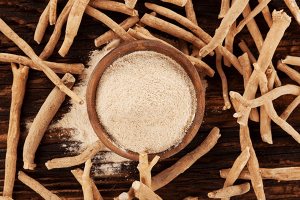
What is Ashwagandha Tea?
Ashwagandha tea is also called Indian ginseng, Winter Cherry, and Indian Winter Cherry. And unlike traditional tea leaves, which are made from the Camellia Sinensis plant, Ashwagandha tea comes from a root.
The root is either ground up into Ashwagandha powder that can be mixed into drinks or put inside tea bags whole and steeped like traditional tea. You may also see Ashwagandha root extract added to tea blends or wellness supplements.
Many cultures boil the Ashwagandha root in milk to help expel toxins and potential irritants that could have been absorbed during the growing process [3]. Some even use the berries from the Ashwagandha plant to help naturally coagulate milk used in cheesemaking [3].
Why is Ashwagandha Considered an Adaptogen?
An adaptogen is any herb or plant that may help combat stress in the body [2]. Turmeric, holy basil, reishi mushrooms, and ginseng are some other adaptogenic herbs and veggies. These are used in herbal medicine to help your body adapt to stressful situations so you can feel your best no matter what life throws your way.
Researchers have discovered that Ashwagandha has anti-stress, anti-anxiety, and anti-inflammatory properties. This may be because Ashwagandha is particularly high in withanolides, a group of 300+ naturally-occurring steroids. These are most often found in foods from the Nightshade family (such as eggplants, peppers, and tomatoes).
And those aren’t its only perks for your mental and physical well-being.
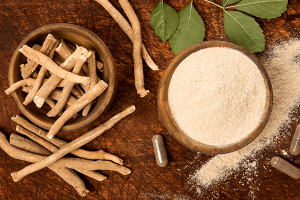
The Health Benefits of Ashwagandha, According to Science
Ashwagandha might be a star in Ayurveda and traditional medicine, but let’s examine some studies in Western medicine to learn more about its potential health benefits.
It’s important to mention this quick disclaimer: while the studies listed below are promising, they’re still too small in size to draw concrete conclusions. So far, science says Ashwagandha may have the following benefits:
1. Supports Brain Health and Brain Function
Researchers have seen Ashwagandha’s positive effect on brain and nervous system health in studies. And it may help support healthy memory in both kids and aging adults [2].
In a meta-review of several studies, researchers noted that Ashwagandha might offer neuroprotective benefits for certain people [4].
2. Supports Stress Relief and Better Mental Well-Being
In Indian cultures, Ashwagandha is labeled as a Rasayana, or a “rejuvenator.” It’s believed to foster better mental health, boost energy levels, and raise overall health to promote longevity [3]. That’s why many Ayurvedic practices encourage Ashwagandha use before turning to antidepressants.
In a small 60-day, randomized, double-blind, placebo-controlled study of stressed adults, researchers noticed that Ashwagandha extract supported more balanced mood and stress levels. It also helped reduce early morning cortisol levels (a stress hormone) in study participants who dealt with chronic stress.
Scientists believe these positive stress-relieving effects came about because Ashwagandha targets the HPA axis, or hypothalamus-pituitary-adrenal axis [5].
3. Supports Better Sleep
The word “somnifer” (from Ashwagandha’s botanical name Withania somnifera) translates to “sleep inducer” in Latin. And Ashwagandha has been used in Indian medicine as a sleep-inducing medicinal herb.
So researchers initiated a small study to see how Ashwagandha affects sleep in participants battling insomnia. They found that 300mg of Ashwagandha root extract taken two times per day helped participants fall asleep faster and improved their overall quality of sleep [6].
4. Supports Healthy Thyroid Hormone Balance
In another small, randomized, double-blind, placebo-controlled study, researchers discovered that 600mg of Ashwagandha extract supported healthy thyroid hormone levels in people with hypothyroidism over an eight-week period [7].
5. Supports Healthy Blood Sugar and Cholesterol Levels
In one very small study of 12 participants with high cholesterol, researchers noticed that taking Ashwagandha root powder for 30 days helped support healthy cholesterol and blood glucose levels comparable to an oral hypoglycemic drug [8].
6. Supports Healthy Fertility for Men
Ashwagandha may not be an aphrodisiac, but its stress-reducing properties may help combat stress-induced male infertility.
In two studies of both fertile and infertile men, supplementing with Ashwagandha supported healthy sperm count, sperm motility, and sperm quality. And 14% of the participants’ partners became pregnant after treatment. As if that wasn’t enough good news, researchers also measured lower oxidative stress and higher antioxidant levels in participants [9][10].
Again, more research is needed to support these findings, but so far it’s exciting to see all the potential health benefits Ashwagandha may bring to the table, especially since there were no reported side effects.
You should still consult with your doctor before trying Ashwagandha to treat any of the conditions mentioned because this guide should not be considered medical advice.
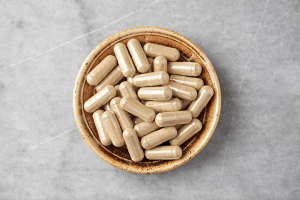
Where To Buy and How To Make Ashwagandha Tea
After learning about all those potential health benefits, you may want to know:
Where To Buy Ashwagandha Tea
Ashwagandha tea has become so popular that you can find it virtually anywhere that sells tea bags or loose-leaf tea. You can buy Ashwagandha tea at major online retailers or your local grocery or health food store.
However, just because it’s easy to locate doesn’t mean you should buy the first one you see. As with any tea, sourcing matters, especially to reap the incredible health benefits. Many commercial teas are treated with pesticides and chemically processed, all of which will seep into your cup of tea. So always look for organic varieties from brands you trust.
How Does Ashwagandha Tea Taste?
Because it comes from a root, Ashwagandha tea has an earthy flavor. Some tea drinkers say it can taste more like dirt than tea, so it’s often mixed with sweeteners like honey or maple syrup and milk.
If you like your tea iced, consider adding fruit like mango or lemon. And for the ultimate tasty Ashwagandha tea recipe, try mixing it with your favorite Earl Gray or Chai tea.
How Do You Brew Ashwagandha Tea?
To brew this potent tea, boil a cup of water, add your Ashwagandha tea bags, and let steep for at least 10 minutes. Enjoy hot or cold!
Frequently Asked Questions on Ashwagandha Tea
If you’ve never tried Ashwagandha tea, you may have questions similar to these FAQs:
1. Is it safe to take Ashwagandha daily?
Unfortunately, there isn’t enough research to support whether it’s safe to drink Ashwagandha tea daily or long-term. Although it isn’t considered harmful for daily consumption, there’s just not enough data to show what happens if you continually consume it over a long period of time.
So if you’d like to drink Ashwagandha tea daily, consider giving yourself a break every so often, especially if you notice any changes in how you feel.
2. Does Ashwagandha cause weight gain?
We don’t have enough concrete studies to prove this one way or another, but so far, the research supports that Ashwagandha shouldn’t cause you to gain weight.
3. Who should not take Ashwagandha?
Pregnant and breastfeeding mothers should not drink Ashwagandha tea since there isn’t enough research to support whether it’s safe to do so.
If you have chronic health conditions, such as an autoimmune disease (like lupus or rheumatoid arthritis), high blood pressure, diabetes, thyroid problems, or stomach issues, it’s best to consult with a healthcare professional before consuming any adaptogen like Ashwagandha.
4. Do I take Ashwagandha in the morning or night?
The answer to this question is tricky and depends on your situation. As a relaxer and sleep inducer, Ashwagandha can help you wind down for the night and may promote better sleep. However, if you have stressful days that cause you to feel uneasy or jittery, you may benefit from starting your day with Ashwagandha tea instead of ending with it.
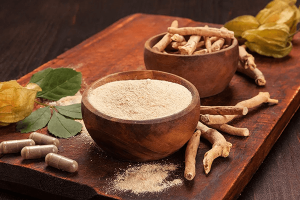
Final Thoughts on Ashwagandha Tea
While this herbal tea may not have been on your radar before reading this guide, you may want to consider including it in your tea rotation, given these possible Ashwagandha tea benefits.
Of course, the taste is something that may take some time to get used to, but you can always add your favorite natural sweeteners or combine it with other teas you love. After all, Ayurvedic practitioners have been doing this for centuries.



